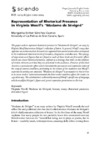Identificador persistente para citar o vincular este elemento:
https://accedacris.ulpgc.es/jspui/handle/10553/110216
| Título: | Representation of Rhetorical Presence in Virginia Woolf’s “Madame de Sévigné” | Autores/as: | Sánchez Cuervo, Margarita Esther | Clasificación UNESCO: | 6202 Teoría, análisis y crítica literarias 57 Lingüística |
Palabras clave: | Virginia Woolf Madame de Sévigné Literary essay Rhetorical presence Rhetorical figure |
Fecha de publicación: | 2020 | Publicación seriada: | Prague Journal of English Studies | Resumen: | This paper seeks to represent rhetorical presence in “Madame de Sévigné”, an essay by Virginia Woolf that reviews Sévigné’s collection of letters. In general, Woolf ’s essays that appraise an author and her/his work are organised into several sections that correspond to the traditional rhetorical levels of inventio, dispositio and elocutio. e synergy of arguments and fi gures that are found at each of these levels are fi rst-order eff ects which can create rhetorical presence, defi ned as a strategy that relies on the selection of certain elements and how they are presented to the audience. Presence of this kind involves a second-order eff ect which transmits the persuasive and expressive value of the essay if several conditions pertaining to the values of the audience and Woolf ’s expertise in writing are attained. “Madame de Sévigné” is persuasive in that it tries to increase readers’ admiration towards the letter writer and thus aff ects the readers in a positive way. is admiration is achieved by means of Woolf ’s specifi c use of language, which amplifi es Sévigné’s fi gure and grants expressive prominence to the text | URI: | https://accedacris.ulpgc.es/handle/10553/110216 | ISSN: | 2336-2685 | DOI: | 10.2478/pjes-2020-0004 | Fuente: | Prague Journal of English Studies [ISSN 2336-2685], v. 9 (1), p. 65 - 85, (Octubre 2020) |
| Colección: | Artículos |
Visitas
95
actualizado el 10-ene-2026
Descargas
56
actualizado el 10-ene-2026
Google ScholarTM
Verifica
Altmetric
Comparte
Exporta metadatos
Los elementos en ULPGC accedaCRIS están protegidos por derechos de autor con todos los derechos reservados, a menos que se indique lo contrario.
